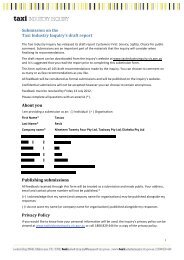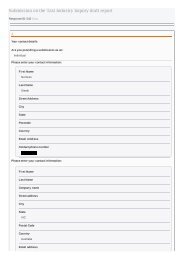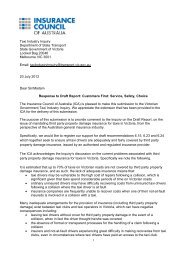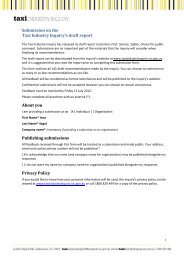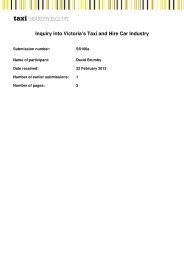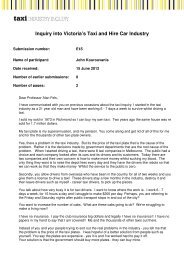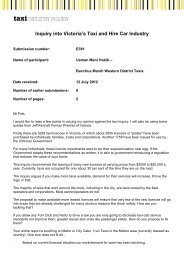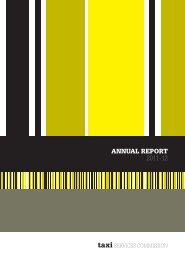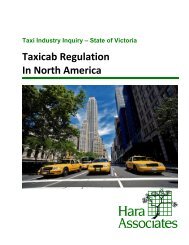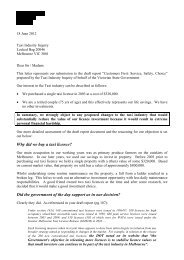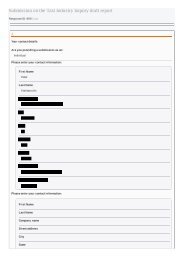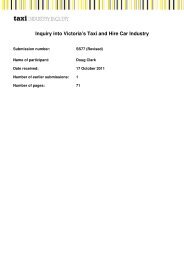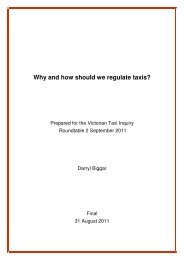Part D â Understanding and improving industry performance (PDF ...
Part D â Understanding and improving industry performance (PDF ...
Part D â Understanding and improving industry performance (PDF ...
Create successful ePaper yourself
Turn your PDF publications into a flip-book with our unique Google optimized e-Paper software.
While there have been reports that some aspects of<br />
service quality can deteriorate following liberalisation, it<br />
is important to keep in mind three things: (1) in cases<br />
where liberalisation resulted in a deterioration of service<br />
quality, supporting quality regulations were generally<br />
lacking; (2) an ‘oversupply’ of taxis does not equate to a<br />
‘deterioration of quality’ – consumers benefit by having<br />
to wait less for a taxi as supply has increased; <strong>and</strong> (3)<br />
the inquiry is aware of no studies that show taxi service<br />
quality in closed entry regimes is better than in open<br />
entry regimes, all else being equal.<br />
9.4.6. Lack of information<br />
Few international jurisdictions have access to the<br />
depth <strong>and</strong> detail of information that is required to fully<br />
assess <strong>industry</strong> <strong>performance</strong>.<br />
During the inquiry’s examination of international jurisdictions,<br />
it proved very difficult to obtain a great deal of meaningful<br />
data on the <strong>performance</strong> of the different taxi <strong>and</strong> hire car<br />
industries. The type of information usually available only<br />
covered static metrics, such as the number of taxis licensed<br />
– <strong>and</strong> even this information was sometimes only available as<br />
an estimate or not available at all.<br />
The inquiry’s view is that aspects of the taxi <strong>industry</strong> that<br />
are easily measured, such as the number of licensed<br />
taxis, are often not good indicators of the <strong>performance</strong><br />
of taxi <strong>industry</strong> when compared with data that is harder<br />
to measure, such as total numbers of trips, <strong>industry</strong><br />
revenue <strong>and</strong> waiting times for consumers. The inquiry<br />
found that the information it considers important is not<br />
collected systematically by regulators in each jurisdiction:<br />
accordingly analysis of international experiences is often<br />
based on anecdote <strong>and</strong> rhetoric.<br />
New York is one of few international jurisdictions<br />
examined by the inquiry that has a readily reliable <strong>and</strong><br />
fairly comprehensive source of information on the taxi<br />
<strong>industry</strong>. The city’s Taxicab Passenger Enhancements<br />
Project (TPEP) system, introduced in 2008 <strong>and</strong> fully<br />
implemented in 2009, is m<strong>and</strong>atory in all New York taxis.<br />
The program enables recording of approximately 30<br />
different data elements (including driver ID, medallion<br />
number, GPS location, pick-up <strong>and</strong> drop-off time, fares,<br />
tipping <strong>and</strong> number of passengers). The New York Taxi<br />
<strong>and</strong> Limousine Commission (TLC) is able to access these<br />
elements directly from each cab for analysis. The TLC can<br />
access the information in real-time via a web application,<br />
with complete data files provided to the TLC on a weekly<br />
basis. While the TPEP system’s primary purpose is to<br />
enable passengers to pay with credit cards <strong>and</strong> improve<br />
the information available to passengers in taxis, its<br />
broader uses include enabling more effective enforcement<br />
<strong>and</strong> compliance, monitoring traffic flows <strong>and</strong> dealing with<br />
lost property.<br />
The most notable use of the TPEP system is that,<br />
after reviewing data gathered from the system the<br />
TLC uncovered thous<strong>and</strong>s of cases of taxi drivers<br />
overcharging passengers through a meter scam to the<br />
sum of approximately $8.3 million. 39 In response, the<br />
TLC instigated a system where back-seat television<br />
screens will alert a passenger when the meter is switched<br />
to a higher rate. While the system has enabled the<br />
TLC to strengthen its enforcement <strong>and</strong> compliance,<br />
valuable information on such things as <strong>industry</strong> turnover,<br />
distribution of trips <strong>and</strong> congestion is readily available.<br />
The amount, quality <strong>and</strong> reliability of information collected<br />
from New York taxis appear unprecedented in the global<br />
taxi <strong>industry</strong>.<br />
In Western Australia, the regulator obtains regular<br />
<strong>performance</strong> data from the major metropolitan taxi<br />
networks. Information gathered from the taxi networks<br />
includes waiting time, jobs not covered, complaints<br />
<strong>and</strong> information relating to passenger <strong>and</strong> driver safety,<br />
such as number of in-cab emergency alarm activations.<br />
This information is used to inform the regulator’s policy<br />
decisions, specifically their licensing approach as<br />
no more licences are released until set <strong>performance</strong><br />
st<strong>and</strong>ards are met. The <strong>performance</strong> of the <strong>industry</strong> is<br />
also published in a quarterly report on the regulator’s<br />
website <strong>and</strong> is available to the public.<br />
The above examples underscore the value of meaningful<br />
<strong>industry</strong> data in informing policy decisions by government,<br />
as well as enabling more effective monitoring <strong>and</strong><br />
compliance. The inquiry believes that reliable <strong>and</strong><br />
informative data is critical to effectively implementing<br />
<strong>and</strong> evaluating regulatory reforms – something that has<br />
generally been lacking in other jurisdictions.<br />
9.4.7. Competition <strong>and</strong> efficiency<br />
Better taxi <strong>and</strong> hire car systems make more effective<br />
use of competition <strong>and</strong> promote efficiency.<br />
The way in which a taxi system is set up can have a<br />
profound effect on the level of competition that emerges.<br />
Experiences from international jurisdictions have shown<br />
that some systems perform better in terms of facilitating<br />
competition <strong>and</strong> efficiency in the taxi markets.<br />
39 For example, see ‘Millions stolen from passengers in NYC taxi<br />
scam’, accessed on 15 March 2012 at: www.rmtracking.com/<br />
blog/2011/01/18/millions-stolen-from-passengers-in-nyc-taxi-scam/<br />
174



